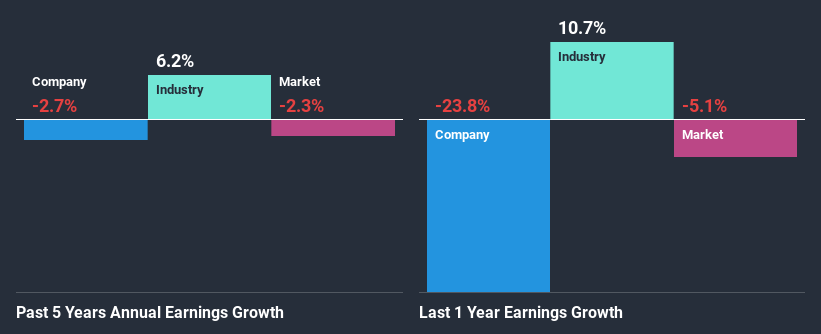Al Khaleej Takaful Insurance Company Q.P.S.C.'s (DSM:AKHI) Stock is Soaring But Financials Seem Inconsistent: Will The Uptrend Continue?
Most readers would already be aware that Al Khaleej Takaful Insurance Company Q.P.S.C's (DSM:AKHI) stock increased significantly by 49% over the past three months. However, we decided to pay attention to the company's fundamentals which don't appear to give a clear sign about the company's financial health. Particularly, we will be paying attention to Al Khaleej Takaful Insurance Company Q.P.S.C's ROE today.
Return on Equity or ROE is a test of how effectively a company is growing its value and managing investors’ money. Simply put, it is used to assess the profitability of a company in relation to its equity capital.
View our latest analysis for Al Khaleej Takaful Insurance Company Q.P.S.C
How Is ROE Calculated?
Return on equity can be calculated by using the formula:
Return on Equity = Net Profit (from continuing operations) ÷ Shareholders' Equity
So, based on the above formula, the ROE for Al Khaleej Takaful Insurance Company Q.P.S.C is:
5.4% = ر.ق30m ÷ ر.ق546m (Based on the trailing twelve months to September 2020).
The 'return' is the income the business earned over the last year. That means that for every QAR1 worth of shareholders' equity, the company generated QAR0.05 in profit.
Why Is ROE Important For Earnings Growth?
We have already established that ROE serves as an efficient profit-generating gauge for a company's future earnings. We now need to evaluate how much profit the company reinvests or "retains" for future growth which then gives us an idea about the growth potential of the company. Assuming everything else remains unchanged, the higher the ROE and profit retention, the higher the growth rate of a company compared to companies that don't necessarily bear these characteristics.
Al Khaleej Takaful Insurance Company Q.P.S.C's Earnings Growth And 5.4% ROE
It is hard to argue that Al Khaleej Takaful Insurance Company Q.P.S.C's ROE is much good in and of itself. Even compared to the average industry ROE of 8.8%, the company's ROE is quite dismal. Therefore, it might not be wrong to say that the five year net income decline of 2.7% seen by Al Khaleej Takaful Insurance Company Q.P.S.C was possibly a result of it having a lower ROE. We reckon that there could also be other factors at play here. For example, the business has allocated capital poorly, or that the company has a very high payout ratio.
From the 2.7% decline reported by the industry in the same period, we infer that Al Khaleej Takaful Insurance Company Q.P.S.C and its industry are both shrinking at a similar rate.

The basis for attaching value to a company is, to a great extent, tied to its earnings growth. The investor should try to establish if the expected growth or decline in earnings, whichever the case may be, is priced in. This then helps them determine if the stock is placed for a bright or bleak future. Is Al Khaleej Takaful Insurance Company Q.P.S.C fairly valued compared to other companies? These 3 valuation measures might help you decide.
Is Al Khaleej Takaful Insurance Company Q.P.S.C Using Its Retained Earnings Effectively?
In spite of a normal three-year median payout ratio of 44% (that is, a retention ratio of 56%), the fact that Al Khaleej Takaful Insurance Company Q.P.S.C's earnings have shrunk is quite puzzling. So there could be some other explanations in that regard. For instance, the company's business may be deteriorating.
Additionally, Al Khaleej Takaful Insurance Company Q.P.S.C has paid dividends over a period of at least ten years, which means that the company's management is determined to pay dividends even if it means little to no earnings growth.
Summary
On the whole, we feel that the performance shown by Al Khaleej Takaful Insurance Company Q.P.S.C can be open to many interpretations. Even though it appears to be retaining most of its profits, given the low ROE, investors may not be benefitting from all that reinvestment after all. The low earnings growth suggests our theory correct. Wrapping up, we would proceed with caution with this company and one way of doing that would be to look at the risk profile of the business. You can see the 2 risks we have identified for Al Khaleej Takaful Insurance Company Q.P.S.C by visiting our risks dashboard for free on our platform here.
If you decide to trade Al Khaleej Takaful Insurance Company Q.P.S.C, use the lowest-cost* platform that is rated #1 Overall by Barron’s, Interactive Brokers. Trade stocks, options, futures, forex, bonds and funds on 135 markets, all from a single integrated account. Promoted
New: Manage All Your Stock Portfolios in One Place
We've created the ultimate portfolio companion for stock investors, and it's free.
• Connect an unlimited number of Portfolios and see your total in one currency
• Be alerted to new Warning Signs or Risks via email or mobile
• Track the Fair Value of your stocks
This article by Simply Wall St is general in nature. It does not constitute a recommendation to buy or sell any stock, and does not take account of your objectives, or your financial situation. We aim to bring you long-term focused analysis driven by fundamental data. Note that our analysis may not factor in the latest price-sensitive company announcements or qualitative material. Simply Wall St has no position in any stocks mentioned.
*Interactive Brokers Rated Lowest Cost Broker by StockBrokers.com Annual Online Review 2020
Have feedback on this article? Concerned about the content? Get in touch with us directly. Alternatively, email editorial-team (at) simplywallst.com.
About DSM:AKHI
Al Khaleej Takaful Insurance Company Q.P.S.C
Engages in the insurance, reinsurance, and takaful insurance businesses for individuals and corporates in Qatar.
Flawless balance sheet average dividend payer.
Market Insights
Community Narratives



